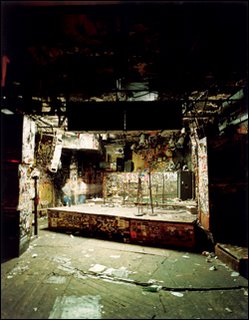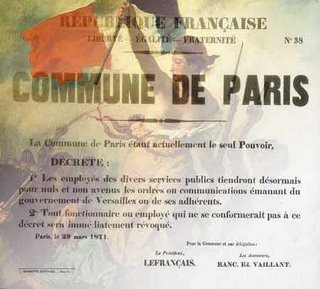WHEN DESIRE BECOMES A YOWL AND A FUZZTONE
So long, CBGBs. If anybody knows about the birthplace of American punk, it's Lenny Kaye:
How many bands and musicians have done the same, I wonder? Estimate 30 bands a week, multiply it by 33 years, averaging out nights when would-be combos no-showed (they broke up in the van coming through the Holland Tunnel, the drummer quit because the guitarist hit on his girlfriend, they were too drunk to find the fucking place) and hardcore "festivals" with a multitude of performers (stage divers yet to be apportioned), counting repeat offenders, subtracting a few from the early years when the club featured only a couple of bands, adding more during the glory years especially if you were in the group or on the guest list, the whole not weighted by prominence or audience draw, all equal from audition night to the prime half-past-midnight spot on Saturday, with 15 percent going to the club off the top.
What's that, 50,000 bands? Maybe 200,000 band members multiplied by three chords?

I went to CBGBs once, in September 2001. I can't even remember who I saw there, but it was all very LA-hardcore. Ironically for a place where community is everything, I remember wishing I was there alone, with no bands, no punters, just a dazzling light projecting from the stage at me, blinding me. I also seem to remember getting rather pissed before I went there - I did that a lot when I was 21 and had to go to places on my own - with the result that, once inside, I just let the crowd push and shove me as they wished.
But however passive my own experience was, you would have known you were in a special venue even if you had not known the history of the place. It was so imperfect (stiflingly hot, ear-bleedingly trebly, vile toilets), so idiosyncratic; and yet, for the last 25 years at least, it has surely been partly a museum. Sonic Youth are one of the last convincingly punk New York groups who would have been proud to cut their teeth there (and please don't talk to me about the Strokes or any of their ilk). Happily, SY played one last show here in June (of which, a brief glimpse here). Even when the influence of the place had waned, it still compressed the thing that makes punk unique among white music: the possibility that this music could really change things, the possibility that going to a punk gig or a club night might actually change your life forever.
*
The Alcazar was a big hall, where drinks were served to thousands. The new petite bourgeoisie, the clerks who filled most of it, would in their workday or domestic lives have taken "rabble" for the crude class insult it would have been. Here they embraced it, out of longing for the proletarian or peasant past they were escaping, out of hatred for the real, propertied bourgeoisie they longed to emulate. Here, in the new domain of regular entertainments and organised leisure, they had a privileged space to dissipate their yearnings and their rage, or to focus them. So Veuillot's anonymous baritone (who along with twenty thousand others was in June 1871 in the extermination of the Commune put up against a wall and shot) (or who had already left town) raises an interesting question: is the cabaret a place where the spirit of negation is born, or is it where that spirit goes to die?
"There was a revolution round the corner," TJ Clark writes, "made by baritones or not." And around the next corner was the trashcan of history. The Commune emerged on 18 March 1871, when Adolphe Thiers's one-month-old conservative parliamentary regime, brought to power by Emperor Louis-Napoleon's surrender in the Franco-Prussian War, fled Paris in the face of the Prussian advance and the desertion of government troops. For the next months almost every radical idea of the previous hundred years was dug out of the ground and put into some sort of practice. Private people once again became citizens, interested in everything, because when everything seemed possible, everything was interesting. "I will never forget those delightful moments of deliverance," one man said. "I came down from my upper chamber in the Latin Quarter to join that immense open-air club which filled the boulevards from one end of Paris to the other. Everyone talked about public affairs; all merely personal preoccupations were forgotten; no more thought of buying and selling; all felt ready, body and soul, to advance towards the future."


0 Comments:
Post a Comment
<< Home